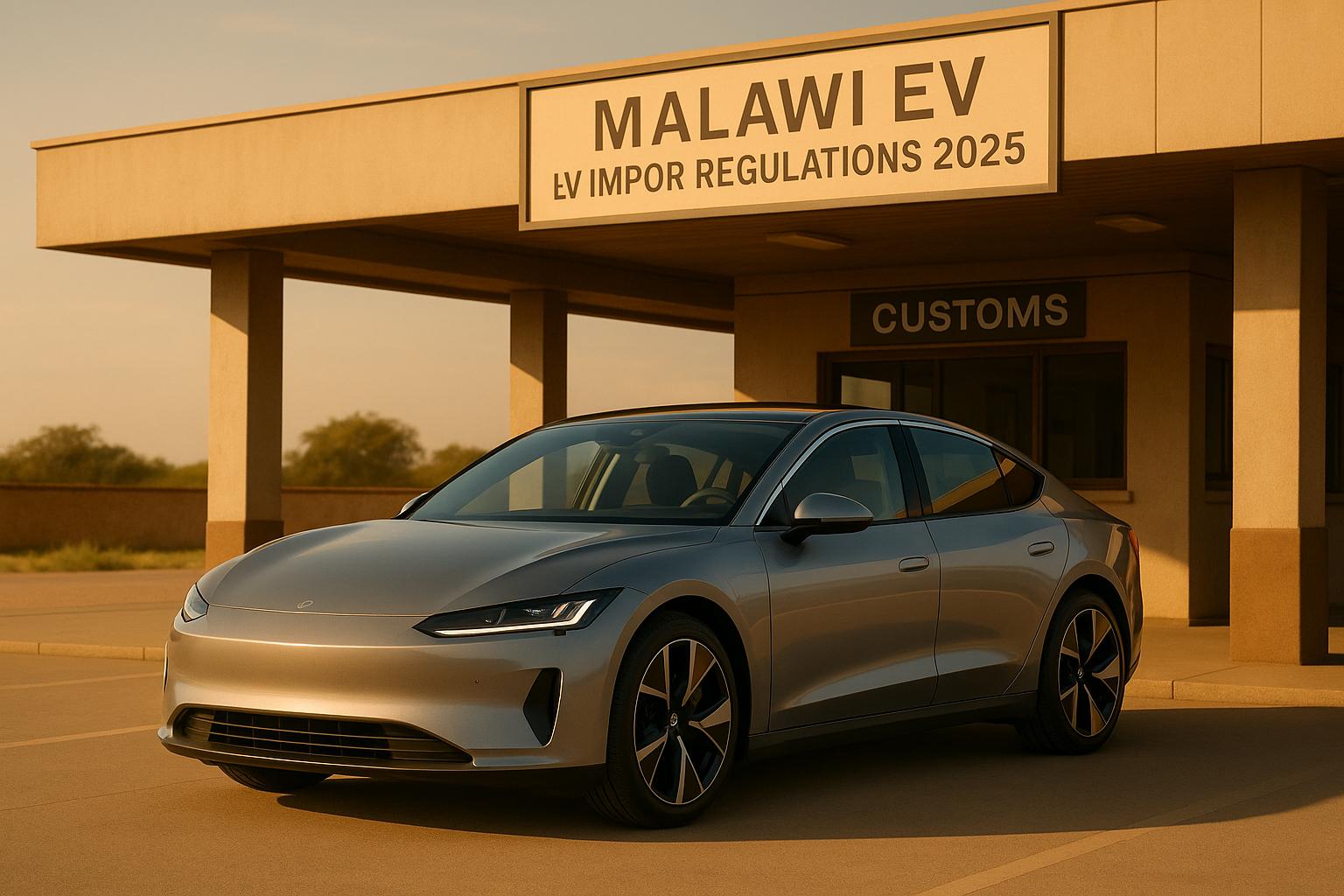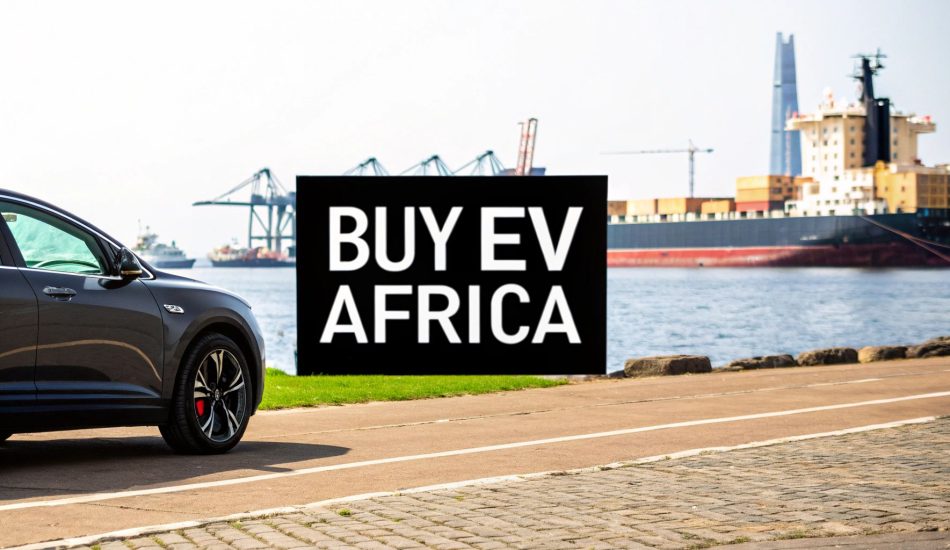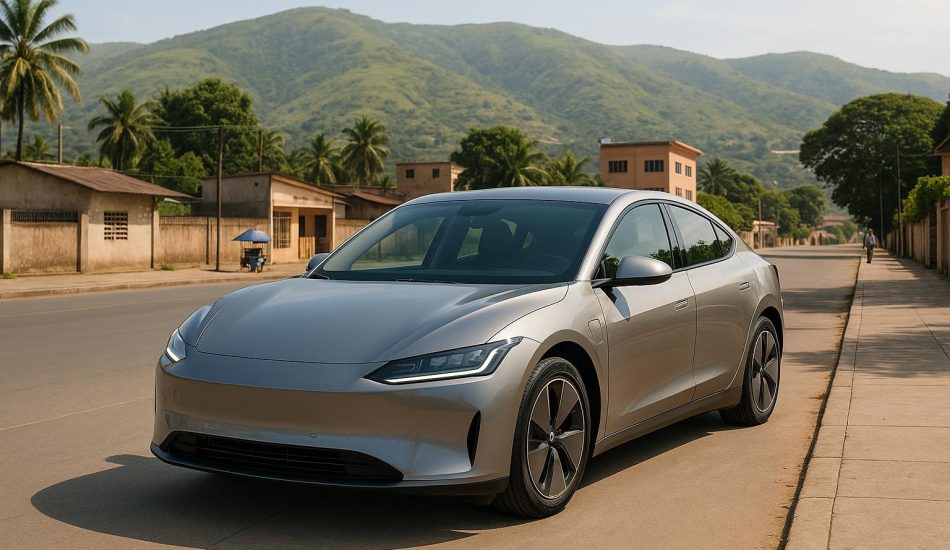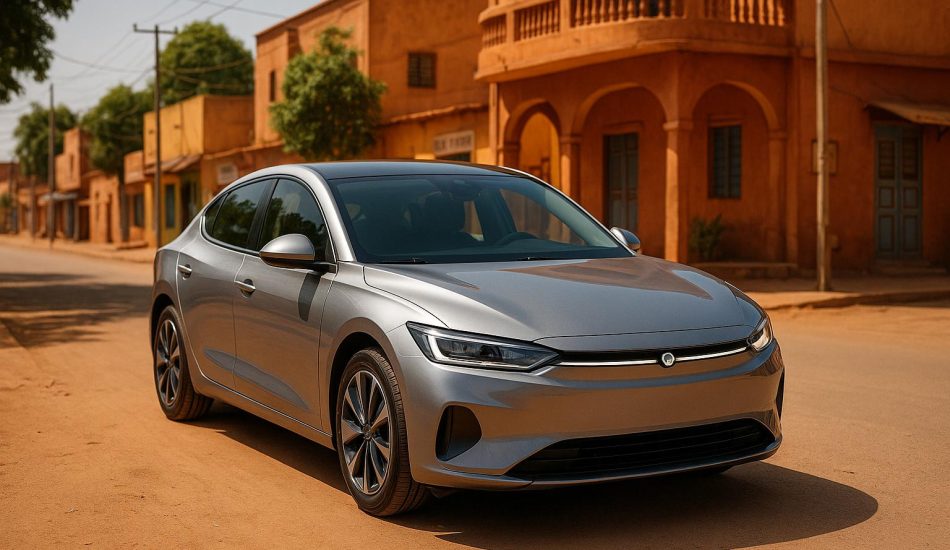
Importing an electric vehicle (EV) into Malawi has become much easier and cheaper in 2025. Here’s what you need to know:
- Zero Import Duty: Fully electric vehicles (not hybrids) are exempt from import duty.
- Lower VAT: VAT on EVs is reduced to 8% (down from 16.5%).
- No Excise Tax for Small EVs: EVs under 100 kW are excise tax-free.
- No Age Limit: Unlike combustion vehicles, EVs have no age restriction for imports.
- Required Documents: You’ll need proof of purchase, a roadworthiness certificate, and possibly a pre-shipment inspection report.
- Customs Clearance: Fees like processing (MK 30,000) and inspection (MK 45,000) apply, but overall costs are much lower than for gasoline vehicles.
Why Now?
Malawi spends over $600 million annually on fuel imports, but with 80% of its electricity coming from hydro and solar, EVs can help reduce costs and emissions. The government is also building EV charging infrastructure and offering incentives to promote adoption.
Cost Savings Example
Importing a $25,000 EV costs about $2,540 in total, compared to $13,415 for a gasoline car – saving over $10,000.
If you’re planning to import an EV, 2025 is the perfect time to take advantage of these reduced costs and simplified processes.
Malawi’s 2025 EV Import Regulations Explained
Malawi is setting the stage for a cleaner transportation future with its new 2025 electric vehicle (EV) import regulations. These rules offer clear guidelines for fully electric vehicles and hybrids, with government incentives tailored to each category.
What’s New in the 2025 Regulations
Starting in 2025, only fully electric vehicles (EVs) will qualify for full benefits, including duty exemptions and an 8% VAT. Hybrid vehicles, while not left out entirely, will see reduced excise tax rates based on their age. Here’s a closer look at the updated excise rates for hybrid electric vehicles (HEVs):
| Vehicle Type | Age | Previous Excise Tax Rate | New Excise Tax Rate |
|---|---|---|---|
| Hybrid Electric Vehicle (HEV) | Under 8 years | 45% | 0% |
| Hybrid Electric Vehicle (HEV) | 8-12 years | 70% | 35% |
| Hybrid Electric Vehicle (HEV) | Over 12 years | 100% | 60% |
These adjustments make hybrids, particularly newer models under 8 years old, much more affordable with zero excise tax on these vehicles.
For EVs, there’s no age restriction for imports, unlike traditional combustion engine vehicles, which are limited to a 10-year age cap. This opens the door for older, well-maintained EVs to enter Malawi, offering more affordable options for buyers.
To be imported, electric vehicles must meet specific requirements, including a roadworthiness certificate and, in some cases, a pre-shipment inspection report to verify details like the battery system, VIN, and year of manufacture. Additionally, the regulations encourage vehicles equipped with Type 2 or CCS charging ports to ensure compatibility with Malawi’s growing network of charging stations.
How Renewable Energy Supports EV Growth
These new regulations align with Malawi’s broader push toward renewable energy and sustainable mobility.
Malawi’s energy landscape is shifting. Although grid connectivity remains limited, the country is making strides in clean energy, with renewables playing a key role. Biomass currently accounts for 89% of Malawi’s total energy supply, contributing to deforestation as forests cover just 36% of the land area. By promoting EVs, the government aims to reduce this environmental strain while fostering energy independence.
Renewable sources like solar and wind are central to this plan, offering a cleaner alternative to the reliance on biomass. This creates a win-win scenario: EVs powered by renewables can help curb deforestation and reduce greenhouse gas emissions.
The benefits of this approach are already visible. For example, in December 2022, UNDP Malawi installed a solar photovoltaic system that now supplies 70% of its energy needs. This shift has cut reliance on diesel generators and the national grid, saving up to $36,000 in diesel costs and minimizing power outages.
Malawi’s leadership is fully behind this transition. Ms. Fenella Frost, UNDP Malawi Resident Representative, highlighted the environmental commitment:
"The launch of this vehicle demonstrates UNDP Malawi’s commitment to supporting the government’s efforts to reduce greenhouse gas emissions and promote environmentally friendly transportation options".
Hon. Ibrahim Matola, Malawi’s Minister for Energy, underscored the broader impact of EV adoption:
"The transport sector is a major contributor to greenhouse gas emissions, which are among the leading causes of climate change. By introducing EVs in Malawi, UNDP is not only reducing our carbon footprint but also leading by example and demonstrating the potential of sustainable mobility solutions."
The economic case for EVs is equally compelling. Malawi faces significant fuel budget challenges, with 80% of the 1,764 public secondary schools lacking fuel budgets for the 2024/2025 fiscal year. Fuel allocations for the education and health sectors account for just 1.74% and 0.85% of total budget votes, respectively. By embracing EVs, Malawi can reduce its reliance on costly fuel imports and channel savings into other critical areas.
These regulations are a step toward energy independence, cost savings, and a cleaner future, all while leveraging Malawi’s renewable energy potential and addressing long-term economic needs.
How to Import an EV into Malawi: Complete Process
Bringing an electric vehicle (EV) into Malawi involves three main steps: completing the necessary paperwork, clearing customs, and registering the vehicle. Most EVs arrive at either Beira Port in Mozambique or Durban Port in South Africa before being transported to Malawi. Once the vehicle reaches the border, the process typically takes 4–7 days, assuming all your documents are in order and there are no unexpected delays.
Required Documents and Paperwork
Getting your documents in order is crucial to avoid customs delays. You’ll need two sets of documents: one for your personal identification and another specific to the vehicle.
- For personal identification, you’ll need your national ID or a valid passport.
- For the vehicle, provide proof of purchase or an invoice showing the purchase price (used to calculate import duties) and the bill of lading, which acts as your shipping receipt and proof of ownership during transit.
A roadworthiness certificate is also required to confirm your EV meets safety standards and includes key technical details like battery condition and charging port compatibility. If this certificate is incomplete, you’ll need a pre-shipment inspection report.
While not mandatory, an import permit can speed up the process by signaling to customs that you’re an authorized importer. Customs may also request additional documents during clearance, such as a certificate of origin, commercial invoice, MRA Form 12, packing list, and others.
For vehicles valued at MK 500,000 or more, you’ll need to hire a Customs Agent. These professionals handle the technical aspects of customs clearance and ensure compliance with Malawi Revenue Authority (MRA) requirements.
Getting Through Customs
The Malawi Revenue Authority oversees customs clearance through the ASYCUDA World system. The process includes filing a declaration, undergoing a physical inspection, and paying the required fees before receiving a release order.
- Declaration Phase: Submit Form 12 along with the required documents. Filing a pre-arrival customs declaration while the vehicle is still in transit can save time by allowing customs to review your paperwork in advance.
- Inspection Phase: Customs officials will inspect the Vehicle Identification Number (VIN), battery, manufacturing year, and overall condition to ensure they match the details in your documents, including the roadworthiness certificate.
After inspection, you’ll pay the applicable fees. Importers of fully electric vehicles may qualify for duty exemptions, significantly reducing costs compared to traditional vehicles. To estimate your total import costs, use the MRA Duty Calculator before your vehicle arrives. Once everything is in order, you’ll receive a release order, authorizing you to take possession of your EV. For straightforward cases, this step takes 1–3 days, but missing documents or complex situations can cause delays.
Registering Your EV with Government Agencies
After clearing customs, register your EV with the Directorate of Road Traffic and Safety Services (DRTSS) to complete the process. Registration typically costs MK 17,000–23,500 and takes 3–4 days.
- Road Traffic Card: Start by obtaining this card from the DRTSS for MK 5,000. It serves as temporary authorization and is usually issued the same day.
- Vehicle Inspection: Schedule an inspection at an approved center, which costs MK 2,000–3,500 depending on your EV’s specifications. The inspection, completed in one day, ensures your EV meets safety standards and confirms technical details like charging compatibility and battery condition.
- Final Registration: Return to the DRTSS with all required documents, including the Customs Clearance Certificate, Road Traffic Card, Roadworthiness Certificate, proof of insurance, vehicle registration form, and your ID. Registration plates and the official certificate cost MK 10,000–15,000 and are processed within 1–2 days.
| Fee Type | Cost | Duration |
|---|---|---|
| Road Traffic Card Fee | MK 5,000 | Same day |
| Inspection Fee | MK 2,000–3,500 | 1 day |
| Registration Plate & Certificate | MK 10,000–15,000 | 1–2 days |
Before buying an imported vehicle, confirm with the MRA, DRTSS, and the Police that it was legally registered. If you’re importing vehicles for business, you’ll also need to register as an official vehicle importer with the relevant authorities.
Import Costs, Taxes, and Money-Saving Incentives
Getting a handle on the costs tied to importing an electric vehicle (EV) is key to planning your budget effectively. Thanks to the 2025 regulations, EV importers in Malawi now benefit from reduced costs, making EVs much more accessible. Beyond the sticker price, you’ll need to account for taxes, fees, and other expenses. Let’s break down the government incentives that make these savings possible.
Government Tax Breaks and Duty Exemptions
Malawi’s 2025 EV import rules bring some serious financial relief, offering savings of 30–40% compared to 2024 rates. These incentives target fully electric vehicles (100% EVs) to promote cleaner transportation. However, hybrids and plug-in hybrids don’t qualify for these benefits.
Here’s where the big savings come in: the import duty on fully electric vehicles has been completely eliminated. While traditional vehicles face a hefty 25% import duty, EVs now enter Malawi without this cost. Additionally, EVs with power ratings under 100 kW are exempt from excise tax (normally 10% for conventional vehicles) and enjoy a reduced VAT rate of 8%, down from the standard 16.5% applied to gasoline-powered cars. On top of that, the government has waived duties on materials for building EV charging stations.
To take advantage of these incentives, it’s essential to confirm that your vehicle is classified as 100% electric. The Malawi Revenue Authority (MRA) will verify this during customs inspections, so ensure your documentation clearly reflects the vehicle’s electric-only status.
Other Fees and Expenses to Expect
While the tax breaks are significant, there are still additional fees to consider when importing any vehicle. These include:
- Processing Fee: MK 30,000
- Destination Inspection Fee (DIF): MK 45,000
- Escort and Cargo Tracking Fee: MK 60,000
- Extended Storage Charges: MK 10,000 per day if your vehicle stays at the port longer than expected
- Customs Clearing Agent Fee: MK 200,000
- Insurance: 1–2% of the vehicle’s declared value during transit
EV vs Gas Car Import Cost Comparison
When you add up all the costs, the difference between importing an electric vehicle and a gasoline-powered one becomes striking. Let’s use a mid-range vehicle valued at US$25,000 as an example:
| Cost Category | Electric Vehicle | Gasoline Vehicle | Savings |
|---|---|---|---|
| Import Duty (25%) | US$0 | US$6,250 | US$6,250 |
| Excise Tax (10%) | US$0 | US$2,500 | US$2,500 |
| VAT | US$2,000 (8%) | US$4,125 (16.5%) | US$2,125 |
| Processing Fees | US$120 (MK 30,000) | US$120 (MK 30,000) | US$0 |
| Inspection Fees | US$180 (MK 45,000) | US$180 (MK 45,000) | US$0 |
| Other Fees | US$240 (MK 60,000) | US$240 (MK 60,000) | US$0 |
| Total Import Costs | US$2,540 | US$13,415 | US$10,875 |
In this scenario, importing a fully electric vehicle costs about US$2,540, compared to US$13,415 for a gasoline-powered car. That’s a savings of over US$10,000!
The World Bank’s Country Manager for Malawi, Firas Raad, summarized the progress well:
"We think Malawi has made some important strides in promoting e-mobility. More, however, has to be done, in terms of the waivers: custom and import duties. And also, the regulatory frameworks that the government has begun to undertake. We think there are improvements but there are further steps that the government should be taking with the ministries of energy and transport."
This shift in policy is particularly impactful given that Malawi spends over US$600 million annually on fuel imports. By reducing import costs for EVs, the government hopes to cut down on this massive expense while encouraging cleaner, more sustainable transportation options.
Before your vehicle arrives, take advantage of the MRA Duty Calculator to get a detailed estimate of your costs. This tool uses up-to-date exchange rates and ensures you have an accurate projection for your import budget.
Meeting Standards and Getting Your EV Road-Ready
Before hitting the road with your imported electric vehicle (EV) in Malawi, you’ll need to ensure it meets the country’s technical standards. Recent updates to regulations are aimed at improving safety and ensuring compliance with local requirements.
Safety Standards and Required Inspections
The Malawi Bureau of Standards has revised its Malawi Wiring and Installation Standard to include technical specifications for EVs. This means your imported EV must align with these updated safety standards.
Before registering your EV, it will need to undergo an inspection to confirm it meets safety and emission requirements. Additionally, a roadworthiness certificate from the exporting country is mandatory, verifying that the vehicle adhered to safety standards in its country of origin.
During the inspection process, officials will carefully examine the vehicle’s wiring and battery connections. Since EVs rely heavily on their electrical systems, this step is essential to ensure safety and compliance.
To avoid unnecessary delays or expenses, make sure your EV adheres to Malawi’s safety and emission standards before shipping. Meanwhile, the Malawi Energy Regulatory Authority (MERA) is working on an e-mobility framework to facilitate the integration of EVs into the country’s transportation system.
Once your EV passes the safety checks, the next step is to ensure its charging system is compatible with Malawi’s infrastructure.
Charging Options and System Compatibility
Malawi’s EV charging network is steadily growing, with charging stations now available in key locations such as Lilongwe City Centre, Blantyre CBD, Mzuzu Mall, and select fuel stations. These hubs form the foundation of the country’s public charging infrastructure.
To ensure compatibility, consider importing EV models equipped with a Type 2 or CCS charging port, as these are most commonly supported by the local network. For home charging, many EVs can be powered using a standard 3-pin plug. If you plan to travel beyond urban areas, choose an EV with a range of at least 250 km to account for rural travel distances. Also, make sure to obtain a battery health certificate before purchasing to avoid unforeseen issues.
MERA has established technical standards for EV charging stations. Approved charging equipment must display a MACRA compliance label, which includes the equipment model and a Type Approval ID (formatted as MLW/MACRA/TA/YYYY/XXXX). Additionally, importers, distributors, and suppliers of electronic equipment must secure a Dealership Registration Certificate from MACRA.
To further enhance the EV ecosystem, MERA is collaborating with neighboring countries to adopt best practices in e-mobility.
With updated safety regulations and an expanding charging network, Malawi is becoming increasingly EV-friendly. By ensuring your vehicle meets all technical and charging requirements, you’ll be ready to embrace the growing opportunities in the country’s electric vehicle landscape.
sbb-itb-99e19e3
Tips for Hassle-Free EV Importing
Importing an electric vehicle (EV) into Malawi can be a straightforward process with the right preparation. Here’s how to make it as smooth as possible.
Working with Trusted Import Partners
Partnering with a reliable import service is essential. Look for companies that handle the entire process – from sourcing the EV to delivering it to your doorstep in Malawi.
It’s crucial to choose partners familiar with Malawi’s logistics challenges, especially given its landlocked position. They should have experience navigating through neighboring ports like Dar es Salaam and should use appropriate Incoterms, such as DDP (Delivered Duty Paid) or FOB (Free on Board), to simplify the process for you.
The ideal import partner will offer access to a wide range of EVs from global suppliers, including options from Europe, Asia (particularly China), North America, and Japan. Whether you’re looking for a brand-new model or a certified used EV, they should provide transparent pricing and detailed specifications. Additionally, they should assist with customs clearance, import taxes, and registration to ensure your EV meets Malawi’s local regulations.
"At EV24.africa, customer satisfaction is our top priority."
For example, in 2024, EV24.africa helped import 50 EVs into Malawi, taking full advantage of the country’s new tax exemptions for electric vehicles. They managed everything – from sourcing vehicles in Europe to delivering them directly to customers in Lilongwe and Blantyre. This comprehensive service resulted in a 40% cost reduction compared to importing traditional gasoline cars.
Also, look for importers offering flexible shipping options, such as RoRo (Roll-on/Roll-off) or container shipping, with choices for port-to-port or door-to-door delivery. A dedicated customer support team is another must-have, providing real-time updates and tracking throughout the process.
By choosing the right partner, you set yourself up for a smoother experience, with fewer delays and complications.
When to Import Your EV
Timing is everything when it comes to importing an EV. With duty waivers and VAT reductions already in place, 2025 presents a prime opportunity to maximize savings. By then, Malawi’s legal framework for EV regulation will be fully established, offering clearer guidelines and a more streamlined import process .
Taking advantage of these incentives in 2025 could mean significant financial benefits, making it the ideal time to bring your EV into the country.
Keeping Complete Records
Good record-keeping is key to avoiding delays and ensuring a hassle-free import experience. Proper documentation is essential for navigating customs regulations and future vehicle registration.
Organize all your paperwork into a comprehensive filing system that includes purchase agreements, shipping documents, insurance policies, receipts, and any other relevant records. Keep both digital and physical copies to ensure nothing gets lost .
Maintaining accurate records not only speeds up customs clearance but also helps with future needs like warranty claims or vehicle resale. Customs officials will feel more confident processing your import when your documentation is thorough and well-organized.
Conclusion
Bringing an electric vehicle (EV) into Malawi in 2025 has become both more affordable and easier to navigate. Updated regulations now offer notable cost reductions compared to the previous year, making the process more appealing for prospective EV owners.
However, success lies in careful preparation. Ensure your EV meets the required specifications: it must be fully electric, have a minimum range of 250 km (155 miles), and include Type 2 or CCS charging ports. If you’re considering a used EV, securing a battery health certificate before purchase is essential to protect your investment.
For a hassle-free experience, consider working with professional import services. These experts can assist with vehicle sourcing, customs clearance, and registration. They’ll also handle the necessary paperwork, collaborate with licensed customs agents, and keep you updated throughout the process – saving you time and effort.
With Malawi’s established EV policies and tax incentives in place, the shift to clean, electric transportation has never been more accessible. Now is the perfect opportunity to embrace this sustainable mobility solution.
FAQs
What are the requirements for a valid roadworthiness certificate when importing an electric vehicle into Malawi?
To bring an electric vehicle (EV) into Malawi, you’ll need a valid roadworthiness certificate issued no more than 30 days before starting the import process. Make sure the certificate meets Malawi’s specific regulations to prevent any hold-ups or issues during customs clearance.
How do reduced VAT and zero import duty for EVs impact the cost of importing compared to gas-powered cars?
The decision to cut VAT from 16.5% to 8% and eliminate import duties on fully electric vehicles in Malawi has significantly lowered the cost of bringing EVs into the country. This shift makes electric cars far more affordable and competitive when compared to gas-powered vehicles, which still carry higher taxes and import duties.
By reducing these financial barriers, EVs become a more accessible option for a broader audience. Meanwhile, conventional vehicles remain burdened with steeper import-related costs, which can substantially drive up their total price.
What is Malawi doing to expand EV charging infrastructure and make it more accessible?
Malawi’s Push for EV Charging Infrastructure
Malawi is making strides in building a robust network of EV charging stations. Key cities like Lilongwe, Blantyre, and Mzuzu are already seeing public charging stations pop up, with plans to roll out more across the country. To keep the momentum going, the government has introduced a National Building Code. This code mandates that at least 5% of parking spaces in new buildings be set aside for EV charging points – a clear move to integrate EV infrastructure into future developments.
On top of that, the Malawi Energy Regulatory Authority (MERA) has stepped in with an EV mobility framework. This framework is designed to guide the setup and regulation of charging stations, ensuring a smooth and consistent rollout. Together, these initiatives aim to make EV charging more convenient and pave the way for broader adoption of electric vehicles throughout Malawi.




